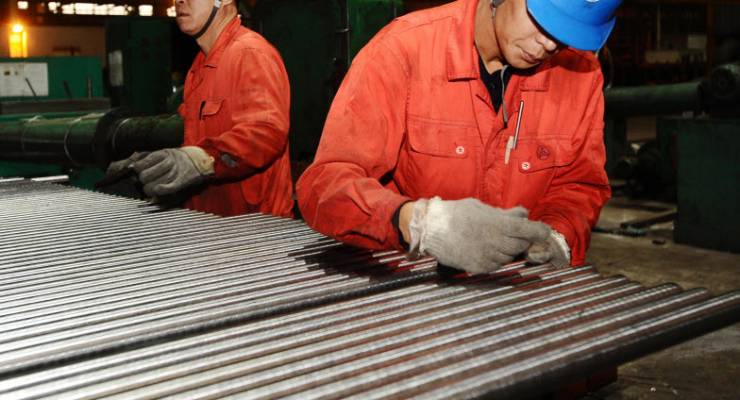
“It’s a competitive market and as you know we love competition, we like free trade, we like open markets, we’re committed to them.”
That was Malcolm Turnbull when he arrived in New Delhi in April, when he declared about India: “it’s time for us to take our relationship to a new level.”
Well, not so much, if you’re an Indian steel exporter.
The Anti-Dumping Commission is where complaints about foreign companies selling cheap products to Australian companies are investigated, often leading to the imposition of anti-dumping tariffs that drive the price of goods up for Australian business and consumers. The favoured industry for such protectionism is steel, where Australian business face significant additional costs ($2 billion per annum) to prop up Australian companies like Bluescope and Arrium and taxpayers and state governments, who face higher construction costs on infrastructure projects.
Bluescope is a serial complainant about its foreign competitors, despite reporting a 79% jump in December half year profit to $359 million back in February, lifting its dividend by a third and approving a share buyback. Last year Bluescope complained about Indian, Malaysian and Vietnamese galvanised steel being imported to Australia. An investigation was announced by the Commission in October and the affected exporters had until November to respond. Then in January the Commission would announce its view on whether dumping was occurring, ahead of a recommendation to the relevant minister in March.
But then the Commission decided to give itself an extension of time — 90 days — in January. The Commission then decided in April it needed to give itself yet more time after demanding information of the Indian government. But it was definitely going to report by May 10.
Well, you wouldn’t pick it, but on May 8, the Commission gave itself yet another extension, this time to the end of May.
In fact, 17 times this year alone, the Commission has announced it was giving itself an extension on anti-dumping investigations. Not so good for business certainty or investor confidence. And all to study why companies are committing the apparently egregious sin of helping Aussie businesses and people building infrastructure keep prices down.








Is it dumping if you sell a product purporting to be a certain grade of steel and it is not? We get a lot of rubbish steel here which is below spec. Not too mention illegal building materials.
‘Below spec.” Frequently we don’t have a clue what ‘spec.’ the steel is produced to.
It’s been a long time since Australia was prepared to stand up against dumped imports in every field, but especially steel. Perhaps more than most, steel is a volume business and no-one likes to slow down or turn off a blast furnace. But that is no reason to unfairly dump products in Australia, even if we are dopey enough to allow it. Australia should support its own industries, and the working conditions we have achieved. How does Australia benefit when we allow industries employing third world labor, with no environmental regulations and, quite often, no idea of what quality of steel they are dumping here, put our workers (and taxpayers) out of business? Yes, it costs Australians a little more, but how expensive would it be for Australia generally if we let every country out there wipe out out entire industrial base? Wait and see what effect the closure of the car industry will have later this year. Automotive employment has been winding down for the last few years, but tens of thousands of fully employed workers are about to lose their jobs and 150,000 others have their jobs undermined. There aren’t even that many low-wage, no-conditions casual jobs out there. Australians have to be prepared to pay more so that their neighbours can have a job and, in turn, buy the gods or services you and I offer. Do we want Australia to become like the US with a moneyed class and a huge underclass scrabbling around in the gutter?
“even if we are dopey enough to allow it” And currently we are – very dopey !!
Oh, and we are rapidly “becom[ing] like the US with a moneyed class and a huge underclass scrabbling around in the gutter?”
Sure, if it wasn’t dumped steel, but mostly it is, and mostly not up to the advertised standard, and non-standard steel is an economically stupid idea, it always costs more in the end.
So Australia has local best coal and buckets of iron ore, and coal furnaces are high-tech and labour a small component, but somehow other countries can ship the coal and iron ore in, do all the manufacturing work up to our standards, and then ship it and sell it back to us at a discounted rate from locally made product, and their only competitive advantage is cheap labour, which is a small part of the overall cost.
I’m calling bullshit economics on this one. Substantial costs to the environment in production and shipping, substantial costs to the health of offshore workers, substantial costs in low quality product being shipped, none of these costs are being factored in.
It’s about counting the cents and forgetting the dollars. Overseas steel is almost certainly not cheaper than local when all costs are taken into account. Therefore dumping, therefore anti-free trade.
“Not so good for business certainty”
Even worse is the absence of ‘quality control’ regarding Indian steel. And the potential overall cost of failures of steel structures.